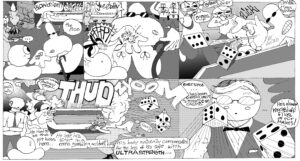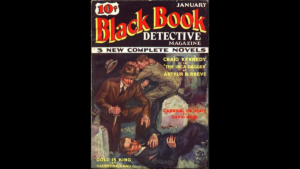By fifth grade, I would criticize super heroes, but I was not smart enough to question the Hollywood promise that everyone achieves their dreams. The movie “Napoleon Dynamite” met me in the middle, showing small men achieving their dreams in rural Idaho. The film’s light and loving eye vindicates Napoleon, with his nun-chuck practice; his brother Kip, with his online-Don Juan pretensions and dreams of becoming Black; Uncle Rico, with his sales of herbal breast enhancements and delusions of becoming a football player; and the TV ad man Rex Kwon Do, who wore American Flag pants on his TV karate ads. All the men are small town Don Quixotes, drawing their aspirations from TV instead of troubadour poetry. Though we recognize that each character’s dream is ridiculous, a little delusional in sight of his surroundings, the film nonetheless suggests that entertaining these dreams is itself a noble calling, one, moreover, that is likely to pay off.
At the end of the movie, Kip, the embarrassing aspiring rapper, meets an attractive Black woman online and leaves the small town wearing a du-rag; an old lover approaches Uncle Rico as he films himself playing football besides his trailer; and Napoleon’s dance wins him a chaste, romantic kickball game with Deb. The coy smile on Uncle Rico’s old lover, as she approaches him throwing footballs all alone, expresses both her admiration for Rico’s TV dreams and her sense they are a little silly. The movie shares her feeling towards all its characters and invites its viewers to do the same. I loved this feeling, and have noticed it crop up again and again throughout my life — admiring someone’s silly convictions, reveling in their enthusiasm, but not sharing them myself, and indeed being grateful I don’t.
The atmosphere of the film also resonated with me. Its depleted color scheme, the flat affects of the characters, and the outsized fantasies they announced in monotone evoked the dryness of my school and the offices I would visit, and their contrast with the hopes nursed within. Shortly after its release in 2004, the film’s style and content began to inflect the advertising world. I noticed it first in the absurdist Skittles and Starburst ads, and then seemingly everywhere. In one of my favorite Skittles ads from the time, a man with a magic beard sits in an office as bleak as Napoleon’s Idaho, picking up skittles during an interview, and then stroking his interviewers face with his beard. In another, a man in a modest polo is fed skittles by an eagle, an eagle he thanks as if this were a helpful, but routine transaction. The same muted colors, office settings and apparel predominate in the ads; the content—the lifelessness of the external world of the office in contrast with the character’s huge dreams and abilities—were straight out of Napoleon.
Real life encounters with Uncle Ricos, Rex Kwon Dos and office workers—with men who screamed out their shortcomings during my soccer practice, who were visibly warped by blockbuster dreams— made Napoleon Dynamite’s redemption of TV-made dreams feel naive. I switched to the Tim and Eric Awesome Show, which consisted of a collection of satires of men shaped by television, essentially the same kinds of people as Napoleon Dynamite’s Rex Kwon Do or Uncle Rico, though no longer portrayed as lovable, or at least innocent, failures.
Instead, the men sweated and cried, betraying a wretched and lonely existence where lust after imagined women and imagined success manifest itself in mucus-thick sweat and violent outbreaks on late night TV. Guilt and sexual crimes cling about Tim and Eric’s telemarketers, making one want to turn from them in repulsion, rather than, as in Napoleon, smile knowingly and with gentle condescension.
Then, in the 2010s, Tim and Eric, who said that they hated advertisements and whose show consisted of grotesque parodies of advertisements, went into advertising. They made a series of show-length ads for Absolut Vodka that garnered more views, probably, than any the company will ever make. They later directed the even more famous Terry Crews Old Spice ads, featuring the chiseled Terry Crews screaming absurd claims about deodorant.
In one of the Old Spice ads, Terry Crews crashes through the exterior wall of a woman’s home on a wave-runner. The woman had been blandly endorsing Bounce Fabric softener before he interrupted her routine, screaming “Old Spice Body Spray makes you smell like power.” The woman is a caricature of consumerist female domesticity, Terry a satire of the consumerist masculinity of advertisements’ constant over-promising. It satirizes so openly and aggressively that it belies a kind of disbelief in the power of its criticism—it declares that advertisements can literally scream out their false premises, poke fun at their ridiculous gender ideals, and still remain effective advertisements.
The difference between Tim and Eric’s cross pollination of advertisements and Napoleon’s spoke to a rift that had begun to grow, not only in my own feelings, but in that of broader culture; where Napoleon vindicated the dreamy effects advertising has on its viewers, and presents middle class life aspirations as lovable in their enthusiasm, Tim and Eric made men, consumption, and the middle class seem untenable, deluded, and grotesque. Both affects and views later appeared in advertisements, whose values seem to trail behind the values of art less and less.
These shifts in sensibility responded to the degradation of our collective sense of manliness, our belief in consumption, and of the prospects of life for middle class people. The workaround produced in answer to these three disillusionments was an ever more aggressive irony. Old Spice no longer sells deodorant that makes you masculine, but rather deodorant that makes you ironically masculine. The masculine buyer buys in, not because he believes that deodorant will change him into a man, nor that the kind of man he would change into is good, nor even, I suspect, for the reason David Foster Wallace identified in the nineties, because buying it one feels “in” with the company — but rather because continuing to buy male deodorant and be a man ironically has been rendered attractive. The proliferation of ironic male figures confirms the shift; Parks and Rec’s Ron Swanson and Dos Equis’ “Most Interesting Man in the World” both lampoon the discredited “steak, whiskey, cigar” ethos while continuing to promote the same. Such figures replace the self-assured John Waynes of the past and the bald eagle is a joke as often as it is taken in earnest.
As in “art”, so in “life”, one finds ironic males on frat house lawns, chest bumping with a slight nod towards its simian brutality, wearing Reagan-Bush 84 shirts, American flag swim shorts, and shouting “America, fuck yeah!” in a spirit of semi-seriousness that seems to declare: “I know we’re absurd, and you do too, but you still want us (or must want us) anyway.”
At times this ironic masculinity can work in service of its own undoing—by drawing attention to desires shaped by power, by television, and their endurance in spite of our conscious corrections, it forgives both parties for being products of history and it points the way forward. More often its use is more pernicious. Through constant self-ridicule, some boys and advertisements deal in a kind of fatalistic irony which implies, and which allows us to repose in, the ungovernability of desire. They know that their lives are despicable but that they will continue to attract us, or so they want us to think, because that’s just how we’re wired.
Theirs is an irony, then, that eats criticism and shits despair. Tim and Eric’s show and advertisements, and all the intelligent, sad, mean boys who are like them (like me, at times) seem to live in a vanishing point between the two ironies, hating what they practice and terribly beholden to it all the same… They perhaps want to stop channeling the way of life they despise, but cannot, so exist as constant self-satires.
The presence of this kind of person, of the seldom serious person, of one who is always channeling a figure they despise, seemed to increase and increase in my life.
These people can be very funny and shrewd in their mockeries, but ultimately produce a deadening feeling. When I felt it, I jolted myself back to health with doses of enthusiastic media, and enthusiastic people, people who seem to believe in things. The movement, if you will, was from Tim and Eric to Napoleon Dynamite this time, and then back again when enthusiasm got cloying, and back again, in a cycle that can be described as post-ironic in the following sense: not the state of being somehow beyond irony, as the new-sincerity people had hoped, but constantly stuck in a state of wanting irony to end, but being too attached to one’s disbelief to really give it up.
Now, the kind of post irony which prevails in some of my circles has a lot to do with social media, and the painful kinds of self-consciousness it produces.
First there is Twitter, which installs a huge, anonymous, moralizing, modish cast of judges into one’s head, which runs in and out of one’s thoughts all day long, threatening a social death no less vivid for being entirely digital. Then, for a different set of people, there is Instagram, which tends to make life appear as a set of scenes to be potentially represented online for various crowds. With Instagram, the possibility of staging life for a shot, the presence of a potential audience, affects how people dress, where people decide to go (Instagram themed pop ups, car shows, museums, depending on the audience), the things they eat (avocados for the GOOP and art set, thick steaks for the car-men), and what they do.
In circles where everyone is on the internet all the time, the question sometimes arises as to whether my friends are really here with me, or rather thinking of their lives and thoughts in the eyes of their followers. Because this doubt frequently weighs on both minds in a conversation, and because these doubts can make socializing itself painful, both parties have to acknowledge that they are not really present, while presenting themselves as if they are.
Being on the internet a lot can also make one accustomed to expecting more time to shape your remarks and self-presentation — time you do not have with IRL interactions. The comparative lack of time can lead to a distinctive anxiety, a sense that life is moving too fast. All of this leads, in some people, to a certain kind of sly, apologetic, and distracted irony which draws attention to the fact that while we are trying to be engaged, we are more truly present with that online crowd we deeply care about and fear and don’t really know.
The variant of post-irony which arises in response to this problem, which represents an attempt to leave this painful irony of self-consciousness behind, is captured by the internet watchwords of “wholesomeness and purity”. These appear all the time on Twitter, Instagram, and Facebook. The overwhelming love for the purity of animal videos is in some part fueled by this desire to escape into less self-conscious, and therefore less ironic beings.
Millennial fixation on the figures of “moms and dads” are similar in character. Facebook pages like “Dad-spotting” show voyeuristic photographs of older men captioned by imagined un-self-conscious thoughts, of the subjects’ simple and straightforward love for their children or for a food or clothing item. The viewer is too sophisticated, disenchanted, or disillusioned to share the subjects’ enthusiasms, but they nonetheless admire the enthusiasm of the “Dad impress[ing] other dad with his giant RC Truck,” “The dad very intently watching the gasoline numbers go up with a very slight smile on his face,” the “Two papas exchanging hiking stories,” the “Sports bar dad (behind bacon snacks machine) [who] is so excited about his team scoring a goal that he clapped his hands and shouted ‘There it is! Yippie kie yay.’” etc. With a picture of a dad photographing himself with an Ipad, one can sense the viewer’s longing for a time when we still felt excitement about gizmos.
The numerous bands named for moms and dads (Soccer Mommy, Mom Rock, The Band Mom, Small Dad, Real Cool Dads, Dad Jeans, My Dad) and the rise of mom fashion and dad fashion all seem part of a broader attempt to inject into present life the previous generation’s apparent lack of internet-derived self-consciousness.
Marianne Williamson’s presidential campaign was experienced in a similar vein—it seemed that some divine, millenial-mystical conviction guided her delightful, if unpractical political remarks. Sad, young, online people talk about Williamson, about their parents, and about animals with the same pathos with which one mourns a lost childhood—seeming to say, “How beautiful their passion, but how impossible in light of what I know.” In saying so they communicate enthusiasm for enthusiasm, while also communicating their distance from the world in which it was apparently possible.
Of a piece with this are the young neo-folk bands which, as an acquaintance once put his efforts, “try to be earnest” through music. Incapable of being so swept up so as to forget one’s image, these groups instead seem to resort to the most proximate images of enthusiasm and un-self-consciousness they possess, those of children. When these bands perform, they thank us for “just showing up”, intoning, “we love you”, and “I hope you like it”, flicking their hair in gestures evocative of children unaware of the presence of others.
When this affect predominates in one cadre of young hipsters, their sentimentality produces a reaction in another who protest, with gestures like noise music. If the neo-folk are cheapening love and forgiving selfishness, then the noise scene seeks, in its dark refusal to make anything melodic, to actually punish its audience, thereby negating the escapism of antagonists in the wholesome folk movement. If dad-spotting revels in the aging male consumer, then the Twitter persona Dril shows him as a wretched clown indeed, more abject than anything Tim and Eric had ever dreamed up.
One suspects that some of the people making up the noise bands vs. folk band, dadspotting vs. dril circuit eventually graduate to the debates occurring in literary circles, defending New Sincerity in the 2010’s or auto-fiction’s bleak “itemized”, disassociated, disinterested view of life a little later on. The Believer magazine sometimes publishes the literary equivalent of contemporary folk bands. Editor Heidi Julavit’s founding essay, “Rejoice! Believe! Be Strong and Read Hard!” was a compelling enough defense of both ambition and good-will in literary production and criticism, but the title nonetheless prepares us for the magazine’s later indulgence of earnestness for earnestness’ sake, ringing already of the twee slogans that now hang in hipster cafés, “Let’s all do this”, “Read a fucking book,” etc. The editors of N+1 dispatched of The Believer in their first issue, saying that its “sole criterion for inclusion is enthusiasm”—a charge that speaks to the way in which reactions to an underlying irony mutually engender one another, fueling the need for new magazines. (Mouse rides this see-saw too.)
The Baffler also seems to take its bearings, at times, from hatred of the impulse to leap into “purity”; a recent takedown of Marianne Williamson, for example, seems fueled by this same recognizable feeling — a contempt for those who seek solace in people who apparently believe in things, while also mourning their own incapacity to believe. In this case, it alleges that this love of wholesomeness blinds them to Williamson’s essentially neo-con-ish political philosophy.
In this wave of responses and counter responses to the prevailing mood of irony, I almost always find myself on The Baffler counter-response side, the noise music side, the Death Grips side, taking shots at those parts of culture which seek to celebrate someone’s enthusiasm, while wistfully acknowledging the impossibility of enthusiasm themselves, or else putting on a show of enthusiasm in a distrustful manner. I often feel that, in reveling in the purity of older generations, of children, of animals, of anyone except me, then we are denying that we might find something worth believing in. “Convictions! Those are cute, but not for me,” we seem to say, when we go Dadspotting.
Then I feel the need to remind people that probably what they are rhapsodizing over is not worth a damn anyway. In this, I feel that am endlessly re-tracing the steps I took away from Napoleon Dynamite and towards Tim and Eric, forever unfairly beating up on that childhood film for taking a more forgiving stance towards television-man, just like Dadspotting does, by moving to a show that turns television-man into a sick creature. And when this Tim and Eric temperament is too hard, I repeat the same movement.
In recent months, working as a daily reporter and working on the Bernie Sanders campaign, I have been forced to think of other things. The need to accomplish certain practical tasks, to write one article each day, converse with this person or that on their doorstep, has made this battle of dispositions seem terribly abstract. It’s not that I can carry on either my reporting or political work with full convictions, without a trace of irony, and, especially after Bernie’s defeat, without profound bitterness – it’s just that doing anything at all, staying busy with moderately important things, helping to clean the baseboards of the human household, has a leveling effect that keeps me away from these alternating bouts of deep, ironic cynicism and sentimental leaps into purity.
In retrospect, this debate probably consumed so much of my attention, and seemed so promising as a solution to life, because of how inactive I was. Perhaps it is only people divorced from politics or movements or practical activity — out of touch with nurses, janitors, people who call newspapers, leaders of neighborhood groups, and all those others who do necessary work for our collective well being — who could think that a new sincerity or some other new temperament in art could save us. Even the most basic political experience should call such a view into question — for temperaments follow from our daily lives, not the other way around.
It took me a long time to realize this because, sitting alone in my room, it was easy to see life as a matter of choosing a temperament, rather than a practical activity. No more of that.
An addendum about Lou Reed
An understandable, though oppressive bitterness runs through many critiques of media consumption and the people who try to redeem media consumers. Indeed, if the authors of these critiques are anything like me, then they may be fueled more by contempt for the TV-dad-sentimentalists, than by hatred of the media-saturated condition the sentimentalists try to redeem.
The heavy grotesqueries of Dril and Tim and Eric, the proud cynicism of some cultural critics, and the agonizing quality of noise music will each prevent the targets of their critique from changing their minds. Media-sentimentalists will sense the contempt these works have in store for them, and, feeling disrespected, probably react by further sentimentalizing. This is probably fine.
Still, perhaps one wants to avoid indicting people while still carrying off a damning critique. I think that my favorite song by Lou Reed, “Satellite of Love”, does this. It models a stance towards our life-of-watching that avoids the pitfalls of cynics and sentimentalists alike.
In this beautiful song, Reed channels a man much like the simple American men celebrated on the Dadspotting meme page and in Napoleon Dynamite — he is someone who “loves to watch things on TV.” He sings: “Satellite’s gone up to the skies, things like that drive me out of mind. I watched it for a little while, I love to watch things on TV. [Chorus] Satellite of Love.” The chorus soars, though in a melancholy way, and the subject later remarks, in a tone of narcotized admiration: “Satellite’s gone way up to Mars, soon it’ll be filled with parking cars.”
The end of the song then breaks into a bubble-gum-pop exaltation of the satellite, complete with snapping fingers, that calls to mind a cheery gang of high-school cheerleaders and jocks. David Bowie joins them with high croons, “satellite of looooooooooove”, making one feel enthralled with satellites and the TV they beam down from the heavens.
This sweeping finale is, in a way, pulling the same moves as Napoleon Dynamite and Dadspotting. It is a slightly jokey redemption of people simple enough to derive meaning from mass-media-consumption. Swept up in the final chorus, the listener cannot help but feel admiration for this boob watching a satellite on TV — this man seems weirdly sublime. At the same time, the listener cannot help but also understand the impossibility of the object being celebrated, this “satellite of love”; the lusterless quality of the subject’s voice, the pathetic, numb openness with which he states, “I love to watch things on TV”, is really damning. We know that Reed is not celebrating the man or satellite in any straightforward manner, certainly not like Napoleon Dynamite might.
In attending to the song’s disconnect, between soaring feeling and stupid object, gorgeous crescendo and the vision of a parking lot on Mars, the listener comes to feel both the profound attraction and absurdity of trying to celebrate our media-saturated condition.
This two-sided respect for people’s judgements, Reed’s performative, holy-man-like lack of resentment for the TV watcher, indeed, his identification with the TV-watcher — when paired with his condemnation of the same, makes this song, for me, the ultimate critique. Like other great artists, Reed can even deny that any critique is taking place at all — feigning objectivity as he often would during interviews. As much as I love Dril and Tim and Eric, I still wish someone like Reed would carry off a critique of today’s media consumers in a lighter, more sympathetic, and therefore more effective style. “WiFi of soul”?




